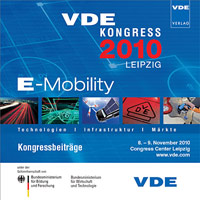Stator-flux-oriented control with high torque dynamics in the whole speed range for electric vehicles
Conference: VDE-Kongress 2010 - E-Mobility: Technologien - Infrastruktur - Märkte
11/08/2010 - 11/09/2010 at Leipzig, Deutschland
Proceedings: VDE-Kongress 2010
Pages: 6Language: englishTyp: PDF
Personal VDE Members are entitled to a 10% discount on this title
Authors:
Spichartz, Moritz; Steimel, Andreas; Staudt, Volker (Ruhr-University Bochum, 44780 Bochum, Germany)
Abstract:
Electric vehicles (EV) pose specific challenges to the used machine, the inverter and the control scheme. High torque at low speed combined with very high maximum speed enforce a wide field-weakening range. In addition the battery voltage varies as a consequence of state of charge and of acceleration or deceleration load current. Especially in case of rapid changes from acceleration to deceleration the voltage changes very quickly. Safety-relevant features like slip-slide control, electronic stability programs or emergency brake assistance require fast torque control in the whole speed range. Stator-flux-oriented Indirect Stator-Quantities Control (ISC) satisfies these criteria with excellent performance, limited only by the physical bounds of available voltage and switching frequency. Moreover it does not require any voltage control margin in field-weakening range. ISC is in practical use in many railway applications with induction machines. The paper introduces the control scheme and demonstrates its abilities by simulations using an induction machine dimensioned for use in an electric vehicle. As the suggested machine does not exist physically, measurements are performed at a test bench for railway application, emulating EV conditions with very wide field weakening by reduction of the DC-link voltage. ISC can be applied to induction machine and permanent-magnet synchronous machine drives as well.


